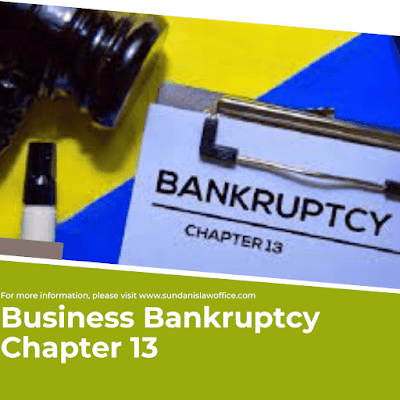Business Bankruptcy Chapter 13
Business Bankruptcy Chapter 13
 |
| Business Bankruptcy Chapter 13 |
Business bankruptcy under Chapter 13 is a type of bankruptcy filing that allows small business owners to reorganize their debts and pay them back over a period of time, usually three to five years. This can help a struggling business to stay afloat and avoid liquidation.
To be eligible for Chapter 13 bankruptcy, the business must have regular income and the total amount of its debts must fall within certain limits. The business owner must also create a repayment plan that is approved by the bankruptcy court and must make regular payments on the plan.
During the repayment period, the business owner must continue to operate the business and make all required payments on time. If the repayment plan is successfully completed, any remaining debts may be discharged, meaning they are no longer legally owed. However, if the business owner fails to make the required payments, the bankruptcy case may be dismissed and the business may face liquidation.
Chapter 13 bankruptcy can be a good option for small businesses that are struggling with debt but still have the ability to generate income. It allows the business owner to restructure their debts and make payments over time, which can help to alleviate the financial burden and keep the business operating.
One advantage of Chapter 13 bankruptcy is that it allows the business to keep its assets while still addressing its debts. This can be especially important for businesses that rely on specific equipment or property to operate. Additionally, Chapter 13 bankruptcy may allow the business to modify certain secured debts, such as mortgages or car loans, which can help to lower the overall debt burden.
It's important to note that Chapter 13 bankruptcy can be a complex process, and it's typically a good idea to work with an experienced bankruptcy attorney who can help guide you through the process. Additionally, it's important to be aware that filing for bankruptcy can have long-term impacts on your credit and financial standing, so it's important to carefully consider all of your options and make an informed decision.
In order to file for Chapter 13 bankruptcy, the business owner must first complete credit counseling and provide the court with a detailed list of all debts and assets. From there, the business owner will work with their attorney to create a repayment plan that is feasible and realistic.
Once the repayment plan is submitted to the court and approved, the business owner will begin making regular payments to a bankruptcy trustee, who will then distribute the payments to creditors according to the terms of the plan. The business owner must also attend a meeting of creditors and may be required to make additional court appearances throughout the bankruptcy process.
It's important to note that Chapter 13 bankruptcy does not discharge all debts, and certain debts, such as taxes and student loans, may not be eligible for discharge. Additionally, if the business owner fails to make payments as required by the repayment plan, the bankruptcy case may be dismissed and the business may face liquidation.
Overall, Chapter 13 bankruptcy can be a useful tool for small businesses that are struggling with debt but still have the ability to generate income. However, it's important to carefully consider all options and work with an experienced bankruptcy attorney to ensure that the process goes as smoothly as possible.
In addition to the benefits of Chapter 13 bankruptcy mentioned earlier, there are a few other potential advantages. For example, if the business owner is personally liable for business debts, Chapter 13 bankruptcy can also provide protection for their personal assets. Additionally, Chapter 13 bankruptcy can stop foreclosure proceedings and allow the business owner to catch up on missed mortgage payments over time.
However, there are also some potential downsides to filing for Chapter 13 bankruptcy. For one, the repayment plan may require the business owner to devote a significant portion of their income to debt repayment, which can make it difficult to cover other expenses. Additionally, the bankruptcy will remain on the business owner's credit report for up to ten years, which can make it difficult to obtain credit or loans in the future.
It's also important to note that Chapter 13 bankruptcy can be a lengthy and complex process, and the business owner will need to stay committed to making all required payments and complying with court orders throughout the process.
In conclusion, Chapter 13 bankruptcy can be a valuable tool for small businesses that are struggling with debt, but it's important to carefully consider all of the potential benefits and drawbacks before making a decision. An experienced bankruptcy attorney can help guide business owners through the process and ensure that their rights and interests are protected.
Posting Komentar untuk "Business Bankruptcy Chapter 13"